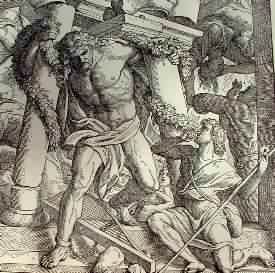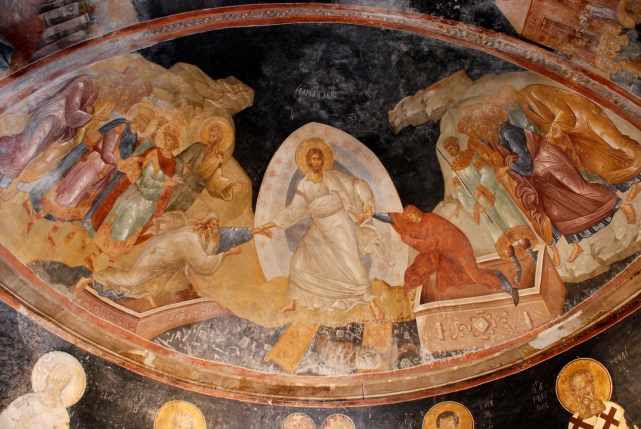
Samson leveling the Philistine temple from Judges 15
“We were around when the Western died and there will be a time when the superhero movie goes the way of the Western.” – Steven Spielberg
Make no mistake, we are living in the golden age of superhero movies.
If one takes a look at the top ten highest grossing film franchises of all time, four of them are based on superheroes: the Marvel Cinematic Universe, X-Men, Batman, and Spider-Man films, all of which collectively account for over $23 billion grossed internationally.
BILLION. As in ten figures, as in nine zeroes after that number.
The year 2016, in particular, has been the biggest ever for the superhero film, with no less than seven movies on the slate: Deadpool, Batman vs. Superman, Captain America: Civil War, Teenage Mutant Ninja Turtles: Out of the Shadows, X-Men: Apocalypse, Suicide Squad, and the soon to be released Doctor Strange, which has already garnered rave reviews in pre-screenings. Eight more are scheduled for 2017, and thirty-three over the next four years!!!
Oversaturation? More like a gushing oil well.

A statue of Heracles taming Cerberus, guardian of the underworld
This has not gone unnoticed amongst the rest of Hollywood, of course, and in addition to several other studios trying to cash in on this craze, celebrities are weighing in on the state of the superhero phenomenon and where we go from here. As one can see from Mr. Spielberg’s comments above, some are posing the question: Was this rise to prominence simply a right-place and right-time thing? All of these characters had been around for at least fifty years. Was the collective boom a phenomenon or fad? Far be it for me to dispute the words of arguably the greatest film director of his generation, but I lean toward the former.
The superhero has always been around in one form or another, from scratches on cave walls to newspapers, radio, television, animation, etc. As a kid I remember loving countless superhero comics and cartoons, as did every other kid my age. By the time I became a young adult, the superhero was regularly on the big screen and thriving. I would put forth simply that we’ve always had superheroes, and fifteen years ago special effects finally reached the point where superhero movies could be made.
Take a look at any culture that has ever existed and you will find stories about heroes, whether in myth or real life. The ancient world had Gilgamesh, Hercules and Samson. The middle ages had Richard the Lionheart and Erik the Red. In postmodern times you get Beowulf, Alan Quartermain, and later Tarzan, Zorro, and others. Now we have even more fictional characters, plus sports stars, war heroes… the list goes on and on.
In C.S. Lewis’ classic work Mere Christianity, a collection of WWII radio broadcasts by the noted Anglican theologian, Lewis says the following with regards to earthly human interests:
“If I find myself in desire which no experience in this world can satisfy, the most probable explanation is that I was made for another world. If none of my earthly pleasures satisfy it, that does not prove that the universe is a fraud. Probably earthly pleasures were never meant to satisfy it, but only to arouse it, to suggest the real thing. If that is so, I must take care, on the one hand, never to despise, or be unthankful for, these earthly blessings, and on the other, never to mistake them for something else of which they are only a kind of copy, or echo, or mirage. I must keep alive in myself the desire for my true country, which I shall not find till after death…”
I had never heard it explained this way. And yet, it makes perfect sense.

A 14th c. icon of the Resurrection, the destruction of death, at the church of Christ the Savior in Chora, Istanbul
There are aspects of each “earthly” human infatuation which echoes something heavenly. Could love of war heroes be an “echo,” to use Lewis’ language, of perhaps the struggle of good vs. evil, and the Church militant? Could heroic acts be a “mirage” of God’s triumphant victory, the destruction of death, and “taking the Kingdom by force?” Could the love a parent has for their child, or perhaps even that a child has for their younger sibling, be a small taste or “copy” of the love that God has for us? Could it be that there is something that echoes our soul’s longing for God in everything that we long for on earth?
I don’t claim to have the answer to this question, but for me it makes sense to consider the possibility of “yes.” Isn’t this why the Orthodox Church incorporates so much beauty in our worship so as to stimulate every sense? God does not need flowers or incense to be worshiped, but for us flowers and incense emulate worship in heaven. Could it be perhaps that human beings have loved stories about heroes for millennia because, without knowing, we ultimately desire to know the Hero of heroes, to celebrate His ultimate victory?
As ridiculous as it may sound, I think Lewis’ analysis is correct. Each of us has a “God-shaped hole” within our hearts, and our earthly longings cannot fill it. But rather than throwing away these earthly longings altogether, we acknowledge that their appeal ultimately points toward something greater.
In other words, it is very human to love stories about superheroes. And that’s pretty cool.
I have no clue why the Western died off, or why war movies diminished in popularity over the years. But I can say that superheroes have been around in every medium that could hold them for the better part of a century now. With movie screens the world over now presenting them believably to audiences, I think they are going to be around for a long, long time.
And that’s totally fine with me.
“When You did descend unto death, O Life Immortal, You slayed Hades with the lightning of Your Divinity. And when You did also raise the dead out of the nethermost depths, all the powers in the Heavens cried out: O Life-giver, Christ our God, glory be to You.” – Orthodox Resurrectional Apolytikion (Dismissal Hymn) in Second Tone


I agree with most all of your points here. Just a question: Do you really think Spielberg was accurate to say the Western has “died”? I’ve heard a lot of pontificating along those lines as well…yet I was just in Books-a-Million the other day and noticed that their Western section remains alive and populated by new publications. Like that of the print book itself, I’m strongly suspicious that rumors of the Western’s death have been greatly exaggerated.
LikeLike
Welcom Justin, and thanks for commenting. Maybe “died off” was too strong of a term to use, but I was just trying to refer back to the Spielberg quote. I think “diminished” would be more accurate. In addition to your bookstore example, you only have to point as far as the recent remake of The Magnificent Seven, studded with lots of today’s biggest stars, to show that it isn’t dead by any stretch.
Even so, my point was that I don’t think superhero movies will go the same way. We also might consider that superhero movies are based just as much on famous characters we know and love (Clark Kent, Bruce Wayne, Peter Parker, etc), as any effects or setting, which endear them to us and ingrain then in our psyche.
I’m rambling now, but I think you get my point. Nothing against Westerns or any other genre, just that there is a lot more staying power here, I think, than we realize.
Thanks again for stopping by!
LikeLike